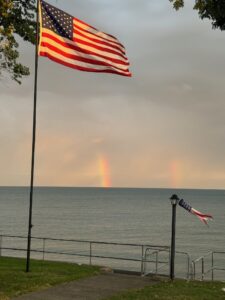Angola resident returns from fighting wildfires
OBSERVER Staff Report
An Angola resident is one of more than a dozen firefighters who have returned to the state after fighting wildfires out west.
Gov. Kathy Hochul Wednesday announced the safe return of 16 wildland firefighters and support staff led by New York State Department of Environmental Conservation Forest Rangers after two-week assignments in Nevada, Utah, and Wyoming. A 10-person crew made up of DEC’s Division of Lands and Forests, Office of Emergency Management, and Forest Rangers assisted with firefighting efforts on the Red Canyon fire, east of Thermopolis, Wyoming. An additional Forest Ranger and Public Information Officer were assigned to the Beulah fire in Utah. One additional Forest Ranger was assigned to the Cottonwood Peak fire in Nevada. Three Forest Rangers were assigned to the area of Helena, Montana.
“For the second time this summer, we are proud to welcome home New Yorkers who offered to help when our neighbors to the west needed it,” Governor Hochul said. “While the federal government cuts critical funding for emergency responses, our expertly trained wildland firefighters and support staff made a difference in three states and brought back invaluable knowledge and experience to New York so they’re at the ready the next time a call for help comes in.”
The Red Canyon fire in Wyoming was caused by lightning. Extreme weather conditions and dry ground caused the fire to grow more than 100,000 acres in four days. The Beulah fire in Utah has burned more than 5,700 acres of land. The cause of the fire remains unknown. The Cottonwood Peak fire in Nevada was caused by lightning and has burned more than 132,000 acres, but is now 81 percent contained. In Montana, there are currently 49 wildfires burning more than 21,000 acres of land
New York State Department of Environmental Conservation Commissioner Amanda Lefton said, “During large wildfires, it takes many different roles to keep the response running smoothly – people who make sure crews have the supplies and equipment they need, those who lead teams of firefighters in the field, and those who share clear information with the public. I’m proud of our dedicated and highly skilled individuals who were able to take on these responsibilities, and all our staff on the front lines who put themselves in harm’s way to fight these fires. I’m happy to have them back home to their friends and family after a long two weeks out west.”
Returning Crew members are as follows:
HELENA, MONTANA
Nicholas Streczywilk – Forest Ranger, Angola
Patrick Dormer – Forest Ranger, Naples
Lincoln Hanno – Forest Ranger, Boonville
COTTONWOOD PEAK, NEVADA
Bryan Gallagher – Supply Unit Leader – Forest Ranger, Shelter Island
BEULAH, UTAH
Erin Hanczyk – Public Information Officer, Lake Placid
Jeremy Oldroyd – Task Force Leader – Forest Ranger, Binghamton
RED CANYON, WYOMING
Jenna Curcio – Forest Ranger, Tupper Lake
Julian Fischl – Lands and Forests, Honeoye Falls
Katherine Fox – Forest Ranger, Medusa
Nicholas Johnston – Emergency Management, Schenectady
Eric Kasza – Lands and Forests, Cherry Valley
David Nally – Forest Ranger, Northville
Art Perryman – Forest Ranger, Wevertown
Joe Pries – Forest Ranger, Holmes
Joseph Sapp – Volunteer, Niskayuna
Matthew Savarie – Forest Ranger, North Creek
Hochul noted New York State is continuing to assist firefighting efforts, with an additional Forest Ranger deployed to Washington as a Task Force Leader to support ongoing fire suppression efforts.
In 1979, New York sent its first firefighting crew to assist western states with large wildfires. On average, one or two crews are deployed as needed to assist with wildfires every year. In addition to helping contain wildfires and minimize damage, these crews gain valuable experience that is utilized fighting wildfires and managing all-risk incidents in New York. All personnel and travel expenses for the New York crews are either paid directly by the U.S. Forest Service or reimbursed to New York State based on a mutual aid agreement between states and federal land agencies.


